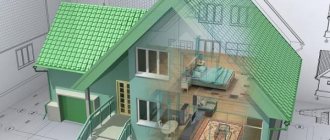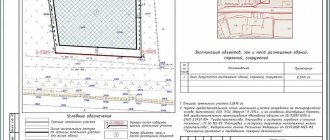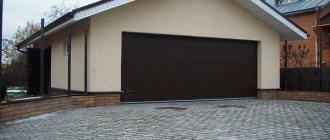How to obtain a building permit - step-by-step instructions
If before August 2021 it was necessary to obtain a construction permit, now the procedure has changed. According to Art. 51 of the Civil Code of the Russian Federation (https://www.consultant.ru/document/cons_doc_LAW_51040/570afc6feff03328459242886307d6aebe1ccb6b/) before starting construction, the land owner is obliged to notify the authorities about this. The form of the document is slightly different, but in general it gives the same powers. Thus, this notification is permission to build a house in SNT. So what is the sequence of actions?
Checking the site category
Simply contacting the administration is not enough; before that, you need to check what category is assigned to the site, and also find out which municipality the land belongs to. If the site is located in a conservation area or in an area not intended for construction, permission will be denied.
Preparation of documents
Preparation of documents is an important stage; you should start with receiving an extract from the Unified State Register of Real Estate.
Then you need to fill out a notice of planned construction in the form approved by Order of the Ministry of Construction of the Russian Federation dated September 19, 2018 No. 591:
- passport details and full name of the person conducting the development;
- cadastral number, address and description of the location of the site;
- presence of other owners;
- information about the purpose of the site;
- layout of objects on the site, distance from borders and other objects;
- notification that in the future the premises will not be divided into several independent objects;
- contact details of the applicant and method of response.
Contacting the organization
The owner is obliged to contact the organization authorized to issue a building permit in a horticultural non-profit partnership (SNT). This could be the local administration, the department of land and property relations, or the town planning committee. Rosreestr, BTI, and the Cadastral Chamber do not deal with such issues.
You can submit documents in any way: by mail, in person, through the MFC, or the State Services portal. If a representative acts instead of the owner of the plot, his powers must be confirmed by a notarized power of attorney.
Read more about how to obtain permission to build a private house through State Services in our article.
Obtaining a building permit
A reasoned decision is made within 7 working days from the date of receipt of the application. If the structure does not exceed the maximum parameters provided for by law, permission will not be denied. If the project has critical deviations, it will be necessary to make adjustments and send the documents for re-approval.
IMPORTANT! The permit is issued free of charge and is valid for 10 years from the date of receipt.
For more information on how to obtain permission to build a house, read our article.
Punishment for non-compliance with the law
In 2021, buildings without permission will not be put into operation; they are considered unauthorized construction. A private house that is not registered in the Unified State Register of Real Estate, does not have a cadastral number, or a passport does not exist in the legal field.
If controversial issues arise with neighbors, for example, regarding land surveying, or claims from administrative authorities in court, the construction may be declared illegal and the construction of the building may be prevented.
If a private house is found in court to be non-compliant and illegal, it can be demolished.
It is impossible to carry out legal actions, donate, inherit, or sell a house, since there are no official documents confirming its existence.
Even if the situation does not become critical, it is planned to impose taxes on non-legalized buildings that are 5-6 times higher than the payments for houses registered in the Unified Register.
Registration of a house in SNT in 2021
If the owner of the plot built a house, this does not mean that he automatically became its owner. To prevent an object from being forced to demolish, it must be registered.
Now there is a simplified procedure, the so-called “dacha” amnesty, which can be used by:
- owner of the site;
- a person who has title documents to land;
- owners of plots in gardening partnerships.
Before registration, you need to collect a package of documents, the most important of which is the technical plan. As a rule, the plan is drawn up by BTI specialists who are qualified cadastral engineers. In the case when the owner does not have a boundary plan, i.e. the land plot is not registered, registration of the house will be refused. You will also need:
- permission to build a house;
- commissioning certificate;
- documents for land. This may be a gift agreement, purchase and sale agreement, or a corresponding court decision;
- receipt of payment of state duty;
- a completed declaration about the object (the form can be found on the Rosreestr website).
The package of documents is submitted to the MFC. After considering the application, the owner will be able to receive an extract that will confirm the registration of the residential premises. You can also register dachas collectively, through the chairman, who has the right to submit such applications on behalf of all SNT participants.
What to do after a positive court decision?
If the court sided with the plaintiff, then it will be possible to register the property rights in Rosreestr. To do this you will need to provide:
- application for registration of property rights;
- the court's decision;
- power of attorney for representatives (if documents are not submitted in person);
- receipt for payment of state duty - 2 thousand for individuals, 22 - for legal entities.
A legal entity can independently provide constituent documents or Rosreestr will do it for it. Additional documents may be required, which will be reported by the organization's employees. The period for registering property rights will be 10 working days.
Construction standards in SNT - requirements for facilities
SNiP 30-02-97, SP 53.13330.2011 regulate construction rules on gardening sites. According to the requirements of the documents, the owner of the site must comply with the following standards:
- the area of the plot should not be less than 0.06 hectares or 6 acres;
- a fence needs to be installed around the perimeter;
- Fire safety requires maintaining distances between objects in adjacent areas. This parameter is determined by the material from which the object is built: non-flammable - 6 m, with wooden floors - 8 m, made of wood - 10 m. In this case, the distance between residential and non-residential buildings on one site does not matter;
- sanitary and household requirements include several points:
- – the distance from the house to the border of the neighboring plot should not be less than 3 m;
- – distance from the house to the street – 5 m, to the driveway – 3 m;
- – if the building is used to keep livestock or poultry, then the distance increases to 12 meters from houses and 1 from other buildings, up to 4 m from trees and 2 m from bushes;
- – the distance between the well and the latrine should not be less than 6 m;
- – the house and the restroom (shower, bath) must be located at least 8 m from each other.
Separate standards relate to the height of the room; the construction of a house in SNT in 2021 must be carried out taking into account all safety requirements. Thus, the distance from floor to ceiling cannot be less than 2.2 m, outbuildings, basements - 2 m, and cellars - 1.6 m, the number of floors - no more than three.
Otherwise, there are no restrictions, the layout, the presence of stairs depends entirely on the wishes of the owner of the site.
But organizing water flow to neighboring areas is strictly prohibited.
A separate requirement concerns water and electricity - access to these communications must be required. The lack of sewerage, gas pipelines, and heating is not considered grounds for refusal to issue a building permit.
When building a house on a dacha or garden plot, you do not need to notify anyone
To register ownership of a house on a summer cottage, you will need only two documents - a technical plan of the house and a declaration (Clause 12, Article 70 of the Federal Law of July 13, 2015 N 218-FZ). These documents are issued only after construction. The law is silent about permission or notification. The declaration comes as an appendix to the plan.
This simplification is valid from July 1, 2021 until March 1, 2021 - clause 12 of Art. 70 of the Federal Law of July 13, 2015 N 218-FZ. The changes were made by Federal Law dated August 2, 2019 N 267-FZ. It is unknown what will happen after March 1, 2021. “Dacha” legislation changes frequently.
Select your situation:
- How to register a country house as your property
- How to register ownership of a residential building on a summer cottage
If you have questions, you can consult for free. To do this, you can use the form below, the online consultant window and telephone numbers (24 hours a day, seven days a week): 8 Moscow and region; 8 St. Petersburg and region; all regions of the Russian Federation.
New law on SNT in 2021
Since June 2021, Federal Law No. 162 “On amendments to the Federal Law “On gardening and horticulture by citizens for their own needs and on amendments to certain legislative acts of the Russian Federation” has come into force. Now permission to build a country house can only be obtained on lands that are part of territorial zones (TZZ), for which town planning regulations have been approved and limits on permitted development have been developed.
For more information on whether it is possible to build a house on a summer cottage, read our article.
An important change concerns the procedure for legalizing buildings for commercial and residential purposes. If they are built on a plot of less than 6 acres, it has become easier to legalize such real estate and obtain registration. The procedure for transferring a non-permanent structure to a capital one and back has also been simplified; now, this does not require organizing a commission visit; it is enough to obtain a positive opinion from a specialist.
On what lands is construction allowed?
All land resources within the country have different purposes and special legislative regulation. Land legislation provides for their division into several categories (Article 7 of the Land Code of the Russian Federation).
The articles of the Land Code provide a complete list and description of them:
- agricultural lands;
- lands of populated areas;
- lands of defense, industry and other special significance;
- lands of specially protected objects and territories;
- forest fund lands;
- water fund lands;
- reserve lands.
Each of these categories has a special status, rules and restrictions for use. You cannot change the purpose of land or types of permissible use at will. According to current laws, it is determined that development is allowed on the first two types of land. At the same time, the status of buildings permitted for construction on them varies.
Responsibility for unauthorized constructions
Liability for buildings in a gardening non-profit partnership without obtaining permission is provided for in Art. 222 of the Civil Code of the Russian Federation. The violator will not be able to obtain documents confirming ownership, and he will be banned from using and living. It is also impossible to sell, donate or bequeath such a building.
According to Art. 25 Federal Law No. 169 “On architectural activities in the Russian Federation”, as well as Art. 222 of the Civil Code of the Russian Federation, a citizen may be required to demolish an unauthorized structure, as well as return the site to its original appearance.
Only a court can recognize a building as illegally erected by issuing an appropriate decision, which must enter into legal force.
District commissions and local administrations do not have the right to demolish a house on their own or force the owner to do so. But their powers include issuing orders that may become the basis for the imposition of administrative fines. In addition, they have the right to apply to the court to declare the building illegal, including in relation to buildings for which the ownership rights were registered with violations.
Article 24 of Federal Law No. 169 provides for the imposition of administrative sanctions. In particular, they may be required not only to eliminate the violations committed, but also to hold them accountable in accordance with Art. 9.4 of the Code of Administrative Offenses of the Russian Federation, namely:
- for violation of technical regulations and requirements for the construction of buildings, impose a fine on an individual in the amount of 1,000 to 2,000 rubles;
- for deviations from the design values of building parameters, which may pose a risk of being fined 2,000 - 4,000 rubles;
- Repeated violation will result in a fine of up to 5,000 rubles.
The procedure for legalizing self-construction
First, you should try to legalize any self-construction administratively, and it can be legalized if it meets the following requirements:
- There is no building permit, but a fine has been paid.
- The type of permitted use of the site does not prohibit the type of construction.
- No violation of the interests of third parties has been established.
- SNiP standards were observed.
In the case where at least one criterion does not meet the squatter’s criteria, it is almost impossible to legitimize it even through the courts. But if the administration refuses to legalize an object that meets all the requirements, then you can go to court.
To do this you need:
Conduct a compliance assessment.- Try to legitimize self-construction in a pre-trial manner: get a refusal from the BTI, Rosreestr or other authorized bodies.
- Prepare the evidence base and conduct the necessary examinations.
- File a claim.
- Submit the claim documents to the court. If the value of the claims is less than 50 thousand rubles - global, and if higher - city or district.
- Register a claim and if the demands are legal, the court initiates civil proceedings.
- Conduct court hearings.
- Pick up a copy of the extract from the court order.
If the plaintiff's demands were not satisfied, he has 10 days to file an appeal to a higher authority. And if, nevertheless, one of the authorities takes the side of the plaintiff, then it will be possible to begin registering ownership of the building.











